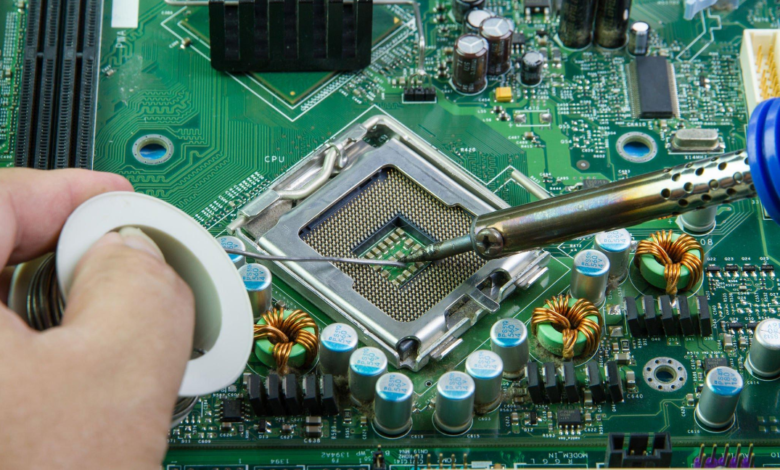Top Factors to Consider When Choosing a PCBA Manufacturer

Printed Circuit Board Assembly (PCBA) plays a pivotal role in the development of nearly every modern electronic product—from telecommunications to industrial robotics. As devices become more complex, the choice of a reliable PCBA manufacturer becomes increasingly critical for businesses that rely on high-performance electronics.
A trusted manufacturing partner can be the difference between on-time delivery and costly delays, or between high-quality performance and constant rework. In this article, we’ll explore what to look for when choosing a PCBA partner, with a special focus on advanced PCB solutions such as Rigid-Flex and High-Frequency PCBs, and how they are used in various cutting-edge industries.
What Does a PCBA Manufacturer Actually Do?
A PCBA manufacturer is responsible for turning raw printed circuit boards (PCBs) into fully assembled boards ready for integration into end products. The process involves:
Sourcing electronic components
Soldering components onto PCBs (SMT and THT)
Testing the finished assemblies for quality and reliability
While that may sound simple on the surface, true expertise lies in the precision, consistency, and scalability of the process. Manufacturers like Global Well PCBA offer turnkey solutions, handling everything from PCB fabrication to final assembly and inspection.
1. Technical Expertise & Engineering Support
Not all PCB designs are created equal. As devices shrink in size and grow in complexity, PCBs require specialized layouts, materials, and techniques. That’s why one of the top factors to consider is your manufacturer’s engineering capability.
A strong PCBA manufacturer should offer:
Design for Manufacturability (DFM) reviews
Signal integrity analysis
Thermal management strategies
Support for complex layer stack-ups
This is especially crucial for advanced technologies such as:
Rigid-Flex PCBs used in aerospace, robotics, and medical devices
High-Frequency PCBs required in 5G, radar, and RF communications
HDI (High Density Interconnect) for smartphones, wearables, and compact electronics
Without proper design input from manufacturing engineers, these PCBs are difficult and expensive to build—and prone to failure.
2. Advanced Capabilities in PCB Fabrication
Before components are placed, the bare board itself must meet high standards. Look for a PCBA provider who also handles PCB fabrication or works closely with trusted board houses.
Important fabrication capabilities to consider:
| Feature | Why It Matters |
| Multilayer PCBs (4–20+ layers) | Supports high-performance computing, power, and communication functions |
| Rigid-Flex Technology | Reduces connectors and cables, enabling smaller, more reliable products |
| Controlled Impedance | Ensures consistent signal quality in high-speed applications |
| High-TG & High-Frequency Materials | Withstand thermal and electrical stress in demanding environments |
Leading manufacturers like globalwellpcba.com specialize in delivering these kinds of technically advanced boards to customers worldwide.
3. Industry Compliance & Quality Control
Electronics made for sectors like telecommunications, robotics, automotive, and medical must meet strict reliability standards. You’ll want a manufacturer that is certified and committed to quality.
Look for certifications like:
ISO 9001 – General quality management
ISO 13485 – For medical device manufacturing
IPC-A-610 – Acceptability standards for electronic assemblies
RoHS & REACH compliance – Environmental and material safety standards
Also, ask about their inspection process. A reputable PCBA manufacturer will use:
AOI (Automated Optical Inspection)
X-ray inspection for BGA and hidden joints
ICT (In-Circuit Testing)
Functional testing based on your product requirements
Read Also: Design Smarter Spaces with Home Controller Integration Tips
4.Turnkey Services and Component Sourcing
Working with a full-service partner helps you reduce vendor management headaches. The best PCBA providers offer turnkey manufacturing, which means they handle:
PCB fabrication
Component sourcing
Assembly (SMT and THT)
Testing
Packaging and shipping
This not only saves time but ensures better traceability and quality control.
Component Sourcing Matters
In today’s world of supply chain disruptions, sourcing is a huge factor. Look for a manufacturer who:
Works with authorized distributors
Provides alternate sourcing for hard-to-find components
Has inventory management tools to ensure continuity
With Global Well PCBA, international customers benefit from strong sourcing relationships within Asia and fast turnaround times—even for complex builds.
5. Scalability and Volume Flexibility
Do you need prototype quantities today and mass production tomorrow? Your manufacturer should be able to grow with you.
Look for:
Small-batch prototyping services
Low-to-medium volume runs
Capability to scale to tens of thousands of units
Scalable manufacturing ensures that your product can move from concept to commercial launch without switching vendors—a major time and cost saver.
6. Cost Efficiency Without Compromising Quality
While cost is always a factor, it’s important to balance price with quality, reliability, and service. An ultra-cheap board that fails in the field costs more in repairs, lost reputation, and delayed shipments.
A transparent PCBA partner will help you:
Optimize design to reduce cost
Recommend alternate components during sourcing
Streamline production timelines
Avoid costly rework through upfront engineering reviews
At globalwellpcba.com, the focus is on value-driven manufacturing, where cost-effectiveness is achieved through smart design and efficient production—not by cutting corners.
7. Industry Applications: Where Advanced PCB Assembly Matters
Let’s take a closer look at how advanced PCB solutions support real-world technologies:
Robotics
Industrial and service robots rely on Rigid-Flex PCBs for movement, control, and sensors—all in tight form factors. These boards support:
Servo motor controllers
Sensor feedback loops
Embedded AI modules
Telecommunications
From 5G base stations to satellite communication, high-frequency PCBs are critical for:
Low-loss signal transmission
EMI shielding
Thermal resistance
Automotive Electronics
Advanced Driver Assistance Systems (ADAS), infotainment, and EV battery management systems use:
Multilayer boards with controlled impedance
High-TG laminates for thermal stability
Conformal coatings for protection
Medical Devices
Small, reliable, and flexible boards are used in:
Wearables
Diagnostic imaging equipment
Surgical tools
A qualified PCBA manufacturer must understand and comply with the regulatory and technical requirements of these industries.
8. Communication and Language Support
Global manufacturing is easier when your vendor speaks your language—literally and figuratively.
Choose a partner with:
English-language support
Responsive communication
Clear project documentation
Online portals or tools for project tracking
This is where Global Well PCBA stands out as a Chinese manufacturer catering to global clients. Their site, communication, and service infrastructure are all built with international customers in mind.
Final Thoughts
Whether you’re designing the next breakthrough in telecommunications or developing a smarter industrial robot, your choice of PCBA manufacturer is one of the most important decisions you’ll make.
The ideal partner is more than just a supplier—they’re a collaborator who helps you improve design, reduce costs, and scale production smoothly. From Rigid-Flex PCBs to high-frequency boards, globalwellpcba.com provides the technical capabilities and customer service that modern OEMs and startups need to thrive.
Make sure your next project is built on a strong foundation—choose a PCBA expert that meets your specs and exceeds your expectations.




